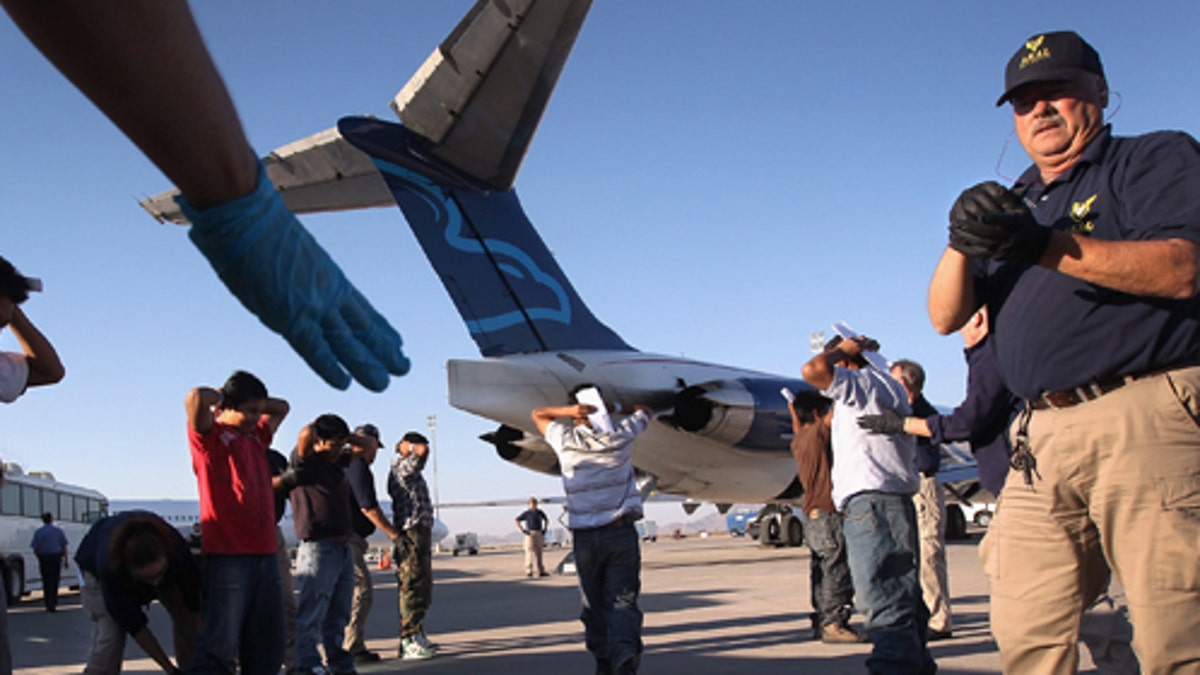
MESA, AZ - JUNE 24: Undocumented Guatemalan immigrants are body searched before boarding a deportation flight to Guatemala City, Guatemala at Phoenix-Mesa Gateway Airport on June 24, 2011 in Mesa, Arizona. The U.S. Immigration and Customs Enforcement agency, ICE, repatriates thousands of undocumented Guatemalans monthly, many of whom are caught in the controversial "Secure Communities" data-sharing program which puts local police on the frontlines of national immigration enforcement. ICE recently announced a set of adjustments to the federal program after many local communities and some states, including New York, insisted on opting out, saying immigrants were being deported for minor offenses such as traffic violations. Guatemala ranks only second to Mexico in the number of illegal immigrants deported from the United States. (Photo by John Moore/Getty Images) (2011 Getty Images)
Phoenix – The most contentious section of Arizona's immigration law - dubbed the "show me your papers" provision by critics - was upheld Wednesday by a federal judge.
The ruling by U.S. District Judge Susan Bolton clears the way for police to carry out the 2010 law's requirement that officers, while enforcing other laws, question the immigration status of those they suspect are in the country illegally.
The requirement has been at the center of a two-year legal battle that culminated in a U.S. Supreme Court decision in June upholding the requirement.
Opponents then asked Bolton to block the requirement, arguing that it would lead to systematic racial profiling and unreasonably long detentions of Latinos if it's enforced.
Lawyers for Arizona Gov. Jan Brewer urged the judge to let the requirement go into effect, saying the law's opponents were merely speculating in their racial profiling claims, that police have received training to avoid discriminatory practices and that officers must have "reasonable suspicion" that a person is in the country illegally to trigger the requirement.
We were surprised and disappointed.
In her ruling, Bolton said the court will not ignore the clear direction from the Supreme Court that the provision "cannot be challenged further on its face before the law takes effect." She reiterated the high court's interpretation that the law might be able to be challenged as unconstitutional on other grounds.
Among the opponents of the law was the Obama administration, which challenged the law based on the argument that federal immigration law trumped Arizona law. The challenge didn't confront racial profiling. The administration failed to persuade the nation's highest court to strike down the questioning requirement.
To the supporters of Arizona's law, the questioning requirement was the most important part of the statute, whose stated purpose was to reduce the problems associated with illegal immigration through enforcement the state's policy.
Immigrant rights groups believe the requirement presented the most opportunities for civil rights abuses.
Shortly before the law was to take effect in July 2010, Bolton prevented police from enforcing the questioning requirement and other parts of the statute, ruling the Obama administration would likely succeed in showing federal law trumps the state law.
Brewer, who signed the measure into law, appealed the ruling, lost at the 9th Circuit Court of Appeals and took her case to the Supreme Court.
Less controversial sections of the law have been in effect since late July 2010, but have rarely been used.
Arizona's law was passed amid voter frustration with the state's role as the busiest illegal entry point into the country. Five states — Alabama, Georgia, Indiana, South Carolina and Utah — have adopted variations on Arizona's law.
Brewer's office said the law is expected to go into effect shortly.
"The courts have now consistently found that the plaintiffs have not met the high bar in arguing this law needs to be enjoined before it's allowed to take effect," gubernatorial spokesman Matthew Benson said. "Certainly Gov. Brewer is pleased with this decision. She believes it's time SB1070 is implemented and so that we can see how effective this law is in practice."
Karen Tumlin, an attorney for the National Immigration Law Center, said her office was "considering our legal options" after Bolton's ruling.
"We were surprised and disappointed," said Dan Pochoda, legal director for the American Civil Liberties Union of Arizona.
Bolton did, however, grant a preliminary injunction against a statute making it illegal to harbor individuals suspected of being in the country illegally.
Based on reporting by the Associated Press.
Follow us on twitter.com/foxnewslatino
Like us at facebook.com/foxnewslatino




